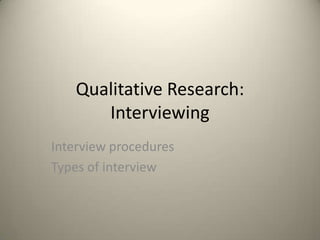Interviewing
•Download as PPTX, PDF•
1 like•793 views
Session slides for language culture communication and social care.
Report
Share
Report
Share

Recommended
Recommended
More Related Content
What's hot
What's hot (20)
Interview Techniques - Leverhulme PhD student training 2017

Interview Techniques - Leverhulme PhD student training 2017
Similar to Interviewing
Research MethodsLecture 8 data gathering the right tools for the right job

Lecture 8 data gathering the right tools for the right jobNewham College University Centre Stratford Newham
Similar to Interviewing (20)
Data collection Instruments in Qualitative Research

Data collection Instruments in Qualitative Research
COMM5600 Interviews & Focus groups TO SHARE (1).ppt

COMM5600 Interviews & Focus groups TO SHARE (1).ppt
Lecture 8 data gathering the right tools for the right job

Lecture 8 data gathering the right tools for the right job
More from Clive McGoun
More from Clive McGoun (20)
Systems approaches to organisational communication

Systems approaches to organisational communication
Recently uploaded
Mehran University Newsletter is a Quarterly Publication from Public Relations OfficeMehran University Newsletter Vol-X, Issue-I, 2024

Mehran University Newsletter Vol-X, Issue-I, 2024Mehran University of Engineering & Technology, Jamshoro
https://app.box.com/s/7hlvjxjalkrik7fb082xx3jk7xd7liz3TỔNG ÔN TẬP THI VÀO LỚP 10 MÔN TIẾNG ANH NĂM HỌC 2023 - 2024 CÓ ĐÁP ÁN (NGỮ Â...

TỔNG ÔN TẬP THI VÀO LỚP 10 MÔN TIẾNG ANH NĂM HỌC 2023 - 2024 CÓ ĐÁP ÁN (NGỮ Â...Nguyen Thanh Tu Collection
Recently uploaded (20)
Micro-Scholarship, What it is, How can it help me.pdf

Micro-Scholarship, What it is, How can it help me.pdf
Python Notes for mca i year students osmania university.docx

Python Notes for mca i year students osmania university.docx
Vishram Singh - Textbook of Anatomy Upper Limb and Thorax.. Volume 1 (1).pdf

Vishram Singh - Textbook of Anatomy Upper Limb and Thorax.. Volume 1 (1).pdf
Unit-V; Pricing (Pharma Marketing Management).pptx

Unit-V; Pricing (Pharma Marketing Management).pptx
Mixin Classes in Odoo 17 How to Extend Models Using Mixin Classes

Mixin Classes in Odoo 17 How to Extend Models Using Mixin Classes
TỔNG ÔN TẬP THI VÀO LỚP 10 MÔN TIẾNG ANH NĂM HỌC 2023 - 2024 CÓ ĐÁP ÁN (NGỮ Â...

TỔNG ÔN TẬP THI VÀO LỚP 10 MÔN TIẾNG ANH NĂM HỌC 2023 - 2024 CÓ ĐÁP ÁN (NGỮ Â...
General Principles of Intellectual Property: Concepts of Intellectual Proper...

General Principles of Intellectual Property: Concepts of Intellectual Proper...
UGC NET Paper 1 Mathematical Reasoning & Aptitude.pdf

UGC NET Paper 1 Mathematical Reasoning & Aptitude.pdf
On National Teacher Day, meet the 2024-25 Kenan Fellows

On National Teacher Day, meet the 2024-25 Kenan Fellows
Food safety_Challenges food safety laboratories_.pdf

Food safety_Challenges food safety laboratories_.pdf
Interviewing
- 1. Qualitative Research: Interviewing Interview procedures Types of interview 1
- 2. Interviewing: Definition – Interviewing is a meeting of two persons to exchange information and ideas through questions and responses, resulting in communication and joint construction of meaning about a particular topic. Janesick (2004): 72 2
- 3. Interview Task • Find someone you know to interview on the following topic. – What are your beliefs about friendship? • The interview should last approximately 15 minutes. 3
- 4. Interviewing: procedures (1) • Establishing relationships – The key is ensuring the person you are interviewing is at ease. How do you do that? • • • • • Tell them what you are doing and why Ask for permission to use a tape recorder/take notes Ensure confidentiality … Be sensitive to body language and tone of voice Ask non-threatening questions first 4
- 5. Types of interview • Interviews range from: – Structured – (directed) Semi-structured unstructured (non-directed) 5
- 6. Interviewing: procedures (2) • Use a schedule which specifies the topics or themes to be covered – For structured interviews this lists the questions to be asked – For unstructured interviews it reminds you which topics/issues to cover (these might not occur in the same order in the interview). 6
- 7. Structured Interviews • Structured Interviews have explicit research goals • Are similar to a verbal approximation of a survey questionnaire • Allow for easy comparison between participants • Responses are shaped by the researcher 7
- 8. Unstructured Interviews • Unstructured Interviews have an implicit research agenda • Are similar to ‘steered conversations’ or ‘conversations with a purpose’ • Questions emerge typically from the conversation • Skill is in finding the most appropriate time to ask questions Choosing which type of interview to use depends on the nature of the research and who you are interviewing. Interviews can move from being structured at the beginning to more unstructured at the end 8
- 9. Types of Interview Questions (1) • Degree of focus – ‘grand-tour questions: • Could you show me around the building?’ • ‘What are the general purposes of this room?’ These enable a broad picture to be obtained – Specific questions: • ‘Please tell me more about …’ These help to find out more specific information 9
- 10. Types of Interview Questions (2) • Degree of open-endedness – Open-ended • ‘How do you feel about …’ Used to discover participant’s perception of the situation. Allows participants to interpret questions their own way. Allows new questions to be generated. – Closed questions • ‘Do you agree with the idea that …’ Restricts participant’s response. Useful to confirm findings 10
- 11. Types of Interview Questions (3) • Types of information – Descriptive • Could you tell me what happened that evening? – Structured • ‘What factors do you think are involved in …?’ – Contrast • ‘In what way has the course improved since last year?’ – Clarification • ‘You talk about how objects represent people. Can you clarify for me what you mean?’ – Follow-up • ‘You mentioned organising space in the room. Can you tell me how you do this to help the residents?’ 11